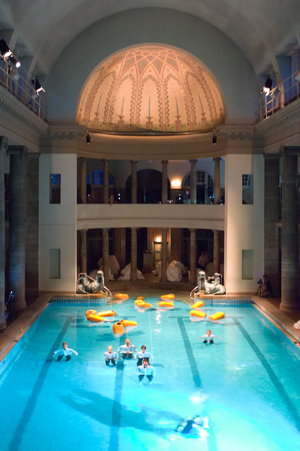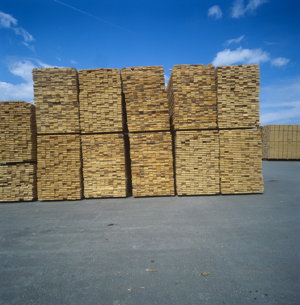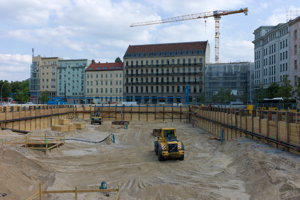Productive Patenschaft
- Written by: Matthew Griffin |
- Created: Tuesday, 27 March 2012 15:13
“Patenschaft - die freiwillige Übernahme einer Fürsorgepflicht (Sharing responsibility for the development and support of something or someone) – Wikipedia
 There is no exact translation of the German word Patenschaft, but English words with similar meaning would be: adopt; godfather, mentor, patron, sponsor. But these words lack the communal aspect, so I will use the German word, as it is closer to the concept of shared responsibility on which this model is based.
There is no exact translation of the German word Patenschaft, but English words with similar meaning would be: adopt; godfather, mentor, patron, sponsor. But these words lack the communal aspect, so I will use the German word, as it is closer to the concept of shared responsibility on which this model is based.
When looking for new structures for urban initiatives, the productive Patenschaft is an interesting model for bringing small scale initiatives together with larger ones.
Patenschaft and the Theater
 Today is world theater day, reason enough to explore the prestructures behind the performing arts.
Today is world theater day, reason enough to explore the prestructures behind the performing arts.
A productive Patenschaft can revitalize communities by changing the way people work together. The Berlin theater community is one example. The large theater houses in Berlin are state funded. The people working there have secure, salaried jobs. In Berlin there are also many small theater companies, who scrape by from project to project. The people who work in these companies almost always have other jobs to pay their rent, and any project funding is usually consumed by the production costs.
The funding system is based on the light-house principle. The state finances big, lavish projects and hopes that the benefits will trickle down to the independent productions. In the last decade state funding of independent projects has dropped from 10% of the culture budget to 2.5%. One way to improve theater in Berlin would be to redefine the way cultural infrastructure is used. State funded theaters are blessed with workshops, studios, props, lights and all manner of specialized infrastructure. These state-run theaters carefully guard their resources and infrastructure and close during the summer. A Patenschaft system could open these resources to independent productions, if it could overcome the fear of sharing expensive equipment. This type of relationship may already happen informally on a small scale, but if Berlin adopted it as a tenet of policy it could transform cultural production.
Strong working relationships between independents and institutions would stimulate both sides to help each other. These new forms of collaboration would foster the expansion of audiences in both types of production.
Independent productions would benefit from the established networks behind the larger houses, and the institutions would rejuvenate their public image and working methods.
Patenschaft would enable independent productions to become more professional. They could mount larger, more challenging projects at a lower cost because the existing infrastructure would be used more efficiently.
Patenschaft in practice
 When studying architecture, I practically lived in the workshop. For people who didn't live there, the Shop Guy, who looked after the workshop and all the tools, was a demon. Outsiders found him erratic and irritable. The Shop Guy was always on edge, trying to look after all these sharp and dangerous tools, and the people using them for the first time.
When studying architecture, I practically lived in the workshop. For people who didn't live there, the Shop Guy, who looked after the workshop and all the tools, was a demon. Outsiders found him erratic and irritable. The Shop Guy was always on edge, trying to look after all these sharp and dangerous tools, and the people using them for the first time.
At some point between walking in for the first time to borrow a drill, and moving in on a permanent basis, I started to see past the sharp edges. The Shop Guy became a mentor. Although he was university staff, he related to us on a different level. The Shop Guy was personally invested in our projects, searching with us for new ways to test the limits of what a model was. Life in the workshop was productive Patenschaft.
I expect that every theater has a Shop Guy, perhaps not just one, but one in every department. Simply the thought of opening up the theater might give the Shop Guy a heart attack. A Patenschaft system would keep the Shop Guy's blood pressure down by vetting potential candidates for responsibility, and respect.
Co-operative Community
These Patenschaft principles could well be extended beyond the example of the Berlin theater community to other spheres. Introducing productive Patenschaft has the potential to knit a community together by reducing the barriers between the big players and the small ones.
How could a productive Patenschaft work in urban development?
 Large sites in Berlin are currently built by large developers who pursue a one tenant strategy. This means there is one entrance that serves a vast unified block. In more sensitive locations the city makes them hang different facades around these monolithic buildings so they appear differentiated. Unfortunately this does not change the use patterns that define how a building works in its environment. The city would be better served by legislating a system of productive Patenschaft to diversify urban development.
Large sites in Berlin are currently built by large developers who pursue a one tenant strategy. This means there is one entrance that serves a vast unified block. In more sensitive locations the city makes them hang different facades around these monolithic buildings so they appear differentiated. Unfortunately this does not change the use patterns that define how a building works in its environment. The city would be better served by legislating a system of productive Patenschaft to diversify urban development.
A site can be split into large and small parts, each developed by separate owners. A productive Patenschaft could go further by integrating the strengths of large and small partners. The Tripod System is one way to do this.
Local initiatives often have trouble winning financial backing from banks. If they were working with large companies, banks would be more likely to support them.
When a large project fails, it is often because the developers completely misread local conditions. They built the wrong thing in the wrong place, without neighbourhood support. Large companies that involve local initiatives would decrease their risk by diversifying their investment, and developing lasting neighbourhood ties.
A productive Patenschaft project creates lively environments, by making the building more accessible; accessible to people who help create it, and accessible to people who use it. It is a potential solution to the Gap Gap, because it creates opportunities for small experimental development. When organizations of different scales and means work side by side, the site becomes a small city. It is dense and vibrant, like the theater.
This post is dedicated to Duncan Swain, and William Weima, the Shop Guys at the McGill School of Architecture. They were committed way beyond the call of duty, and gave me a completely new perspective on just about everything.
The Koaltion der Freien Szene has written an open letter demanding that Berlin reform the way the independent arts are financed. Please consider signing their online petition for a new funding model for the perofrming arts in Berlin.